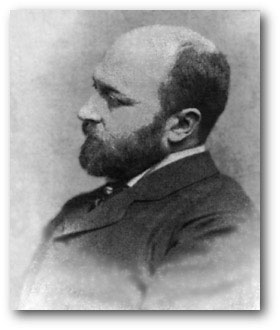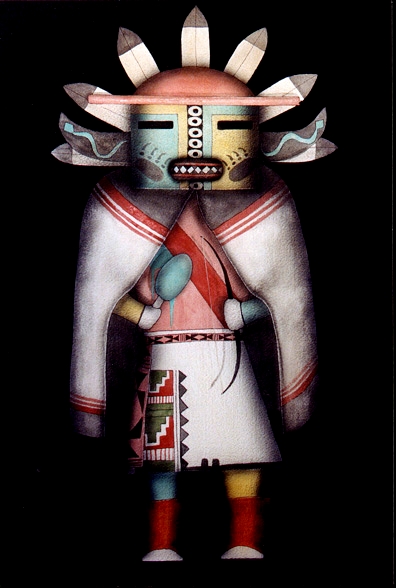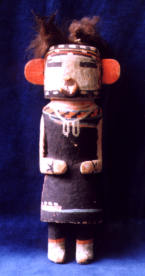
American
Romanticism:
Lecture notes
Henry James, N 1498-1539 (Daisy Miller: A Study)
|
Dickinson poems Romanticism > Realism; James intro reading: Katie Breaux [break] assignments & final exam poetry: Kristin Hamon |
|
Post-Romanticism: High Realism
Thursday 13 November: Henry James, N 1491-1532 (Daisy Miller: A Study)
text-objective discussion leader: Katie Breaux
poetry: Elizabeth Bishop, “The Fish,” N 2399
poetry reader / discussion leader: Kristin Hamon
Post-Romanticism: Harlem Renaissance & Jazz Age
Thursday 20 November:
Harlem Renaissance: Claude McKay, N 2-2086. Zora Neal Hurston, N 2157-61. Jean Toomer, N 2179-84. Langston Hughes N 2263-68. Countee Cullen, N 2283-87 + "From the Dark Tower" & "For a Poet" (web posts)
text-objective discussion leader (Harlem Renaissance): Ayme Christian
Jazz Age: F. Scott Fitzgerald, N 2184-2201 (“Winter Dreams”)
text-objective discussion leader (Fitzgerald): Laurie Forshage
Thursday 4 December: Final exam. Students may take final exam in-class or by email.
Assignments
James, Daisy Miller
assigned questions
What traces of Romanticism remain?
What happens instead of Romanticism?
How essential is some element of Romanticism or romance for reader interest? (Daisy Miller was James's most popular story.)
Byron, "The Prisoner of Chillon" (1816)
"American girl" as embodiment of nature, object of desire >
Daisy Miller > Daisy Buchanan in Fitzgerald's Great Gatsby
next week: Judy Jones in Fitzgerald's "Winter Dreams"
Romanticism > Realism
studying literature by periods, "periodization"
courses like "American Romanticism," "Victorian Literature," and "Medieval Literature" are all period survey courses.
downsides:
period styles and subjects can seem like a formula or straitjacket for fitting unique pieces of literature; e. g., the question "How is this text Romantic?" can turn an individual work of art into more of the same
upside:
ideas of a period norms make reader aware of when writers individualized, anticipated future, or revisited past forms ("can't break the rules if you don't know the rules")
seeing social trends and variants in one historical period > corresponding patterns in one's own
Civil War > Industrialization, immigration
|
Romanticism |
Realism |
|
| when? | app. 1820s-60s | app. 1865-1914 |
| national economy | "mixed" economy | increasing industrialization and urbanization |
| political models | "common man" democracy, abolitionism, women's rights; goal of egalitarian society | plutocracy, robber barons and captains of industry; acceptance of class distinctions except for individuals |
| determining source of action | heroic individualism | social determinism |
| attitude toward social boundaries, classifications | breaking boundaries, crossing borders | reduction of individual to type or class |
| obvious comparison? | the 60s | the 80s |
James introduction

James portrait at 70 by his friend Thomas Singer Sargent
James considered one of the four or five greatest American authors
greatness defined by genius / talent, productivity, continuity and change with literary traditions, influence on later writers
greatest American writers: Faulkner, Whitman, Melville, James, Dickinson
followed closely by Wallace Stevens, T. S. Eliot, Hawthorne, Emerson, Fitzgerald, Hemingway . . . Morrison?
Contrast James and Whitman
James (1843-1916) came from affluent and literary background, traveled widely in Europe all his life, many friends and associates in literature and the arts
Whitman (1819-1892) came from a working family, tried carpentry, teaching, etc., moved from Long Island to Manhattan and Washington for the sake of social and artistic life, worked as a journalist
James in literary studies
James divides readers. Some scholars dismiss him as prissy or obscurantist or bloodless, but others find his very limitations interesting within the context of his genius and his dedication to exploring and extending his abilities.
Extremely productive novelist over a long lifetime. Wrote many novels, many quite long, all of impressive quality; novellas; short stories; travel writing; prefaces; plays; critical reviews; voluminous correspondence; notebooks.
style often compared to Hawthorne's: delicacy, precision, intelligence, carefulness, complexity, sophistication, ambiguity (more "red-blooded" readers and writers may disdain these qualities )
Complexity + productivity = many possible meanings and applications of James. As with all "classic" texts, James benefits from re-reading and rethinking; therefore a critical favorite.
personal preference for James: reader learns from reading James; if literature combines entertainment and education, James makes intellection a sensory process.
T. S. Eliot on Henry James: "He had a mind so fine that no idea could violate it."
What does it feel like to think socially? What kinds of mistakes of diminution or graces of generosity does a mind make?
T. S. Eliot on Henry James: "a historian of fine consciences"
By same token, James's appeal is mostly to academic or critical readers. But you can be surprised by who likes him.
But to limit . . . "American Romanticism" is a "period course" >
lifespan and artistic experimentation cover three major periods
born 1843 during American Renaissance, Henry James Senior associated with Transcendentalists, friend of Emerson, wrote for Brook Farm journal
most of his mature work is associated with Realism, esp. "Psychological Realism" representing workings of human conscience and consciousness--The Portrait of a Lady (1881)
His later work anticipates twentieth-century Modernism, with works like The Wings of the Dove (1902) and The Golden Bowl (1904) using techniques approaching the stream-of-conscious later associated with James Joyce, Virginia Woolf, and William Faulkner.
compare to Beechers and Adams as USA's 3 greatest literary families
LITR 5733: Henry James: Family & Film
new graduate course being planned in "Major Authors"
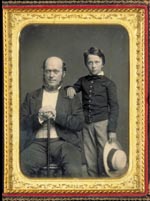
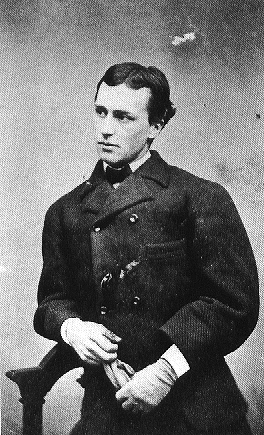
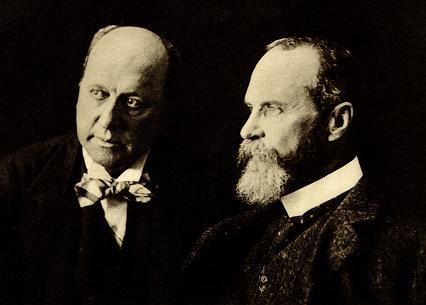
Henry James with his elder brother William James (1842-1910). As Henry James is widely regarded one of the USA's greatest novelists, William James is widely regarded as one of the USA's greatest philosophers. Influenced by Emerson (who blessed him as an infant) and associated with the late 19th-century movement known as Pragmatism, William James is also regarded as one of the founders of modern Psychology as a discipline separate from Philosophy: The Principles of Psychology (1890). He is particularly remembered for his studies in the psychology of religion: The Varieties of Religious Experience (1902).
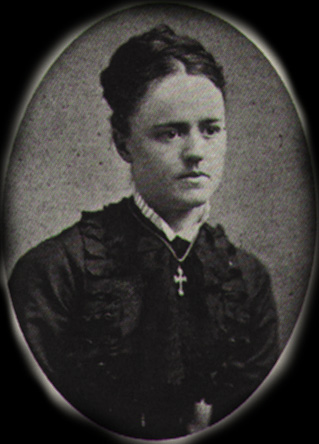
Alice James (1850-92) became example of "Shakespeare's sister"
(Virginia Woolf, "A Room of One's Own"), whose own talent seemed never
to find the same avenues for expression as her brothers. Her diary and letters
were published during recent decades of feminist scholarship and inspired Susan Sontag's drama Alice in Bed (1993).
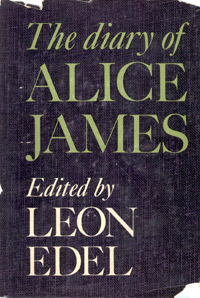
Final notes & question comparing James and Whitman--shift discussion from Romanticism / Realism to newer categories
In American literature, Whitman and James enjoyed the longest and most productive professional lives.
Both writers constantly experimented, took chances, stretched their abilities and, in the process, the powers of literature generally
Comparatively speaking, most other great writers, especially in and after Romanticism, tend to have about a 10-year burst of quality, after which they tend to fade.
Whitman and James kept writing, experimenting, taking chances, leading, failing, rising to try again . . . .
So far, this description becomes a familiar story of "follow your dream, climb every mountain, be all you can be"
How does the discussion change if we add in the factor that, by all available evidence, both Whitman and James were homosexual or gay?
Leftover notes from previous classes
Instructor's notes:
Only now learning how to talk reasonably--not just to "tolerate" but actually to see sexual difference as a factor in our lives and our civilization
Social pressures against reasonable discussion or for repression vary according to school, level
Astounding progress in a single generation
Potential for improving humanity
Compare "black is beautiful" in 1960s-70s: a whole new range of aesthetics opened
"Out of the closet" since 1980s--sexuality makes the subject all the more confusing or threatening but also potentially meaningful
What was formerly hated now becomes something fair to be learned, appreciated for what it is rather than what we may have been erroneously instructed
Power of literary study, or its lack!
"It's only a story"--"We were just talking"
On one hand, literature seems not to matter; on the other hand, this lack of importance can give us some freedom to take chances in a way that won't occur to accountants or engineers--
Southwest American Indian author, preview Katzina
|
|
|
|
|
|

Readings
Pre-Romantic > Romantic > post-Romantic
Survivals, revivals, or adaptations of Romantic style in later literary periods; participation in style by Native American and African American writers
Final 3 class meetings concern periods or movements after Romanticism / American Renaissance
next week, sub-movement of Realism known as "Regionalism" or "Regional Writing" or "Local Color"
Norton, pp. 1231-33
next week's readings:
Two standard or classical Local Color authors:
Mark Twain (Huck Finn: use of dialect common in Regional writing movement)
Sarah Orne Jewett: exquisite short story writer who should be better known--Local Color and Regional Writing often a vehicle for women writers
Concept of "regional" expanded to include African American writer (Chesnutt) and two Native American sources (Zitkala-Sa and Black Elk).
Chesnutt as leading African American author of late 1800s, early 1900s
Zitkala-Sa, Black Elk, and Wovoka as authors or speakers of American Indian literature / culture during "Indian Wars" period (late 19c)
Questions: What's Romantic or Realistic about these late 19c texts? Where do the two concepts cross each other, or their boundaries are blurred?
How does reading multicultural texts challenge or enrich traditional European-derived concepts like Romanticism and Realism?
No "text-objective discussion" reader assigned
Therefore take advantage of fact that our course in American Romanticism is coexistent with Dr. McNamara's course in "American Realism"
Students who are taking both courses:
What have you learned in either class that helps you understand the other?
Especially, what did you learn about Realism that casts light on Romanticism?
LITR 5536 American Realism syllabus
None of this is to leave out other students--welcome to draw in other courses that have discussed either Romanticism or Realism.
Research Project due (within
72 hours of class).
absolutely due by 24 Nov., or let me know what's going on
receipt acknowledged within 24 hours (except on Saturday?)
posted to webpage
read and returned before final exam
students may ask for any webpage contributions to be removed after final grade reports are sent out.
coming week: welcome to confer in person, by phone or email; can't do "pre-reading," but if you walk me through a situation, I'll look over some passages and help as I can.
final notes regarding research projects:
If you're doing a journal, make sure to look at previous journal submissions to gain sense of possible organizations
All students are welcome to use previous research projects as sources
